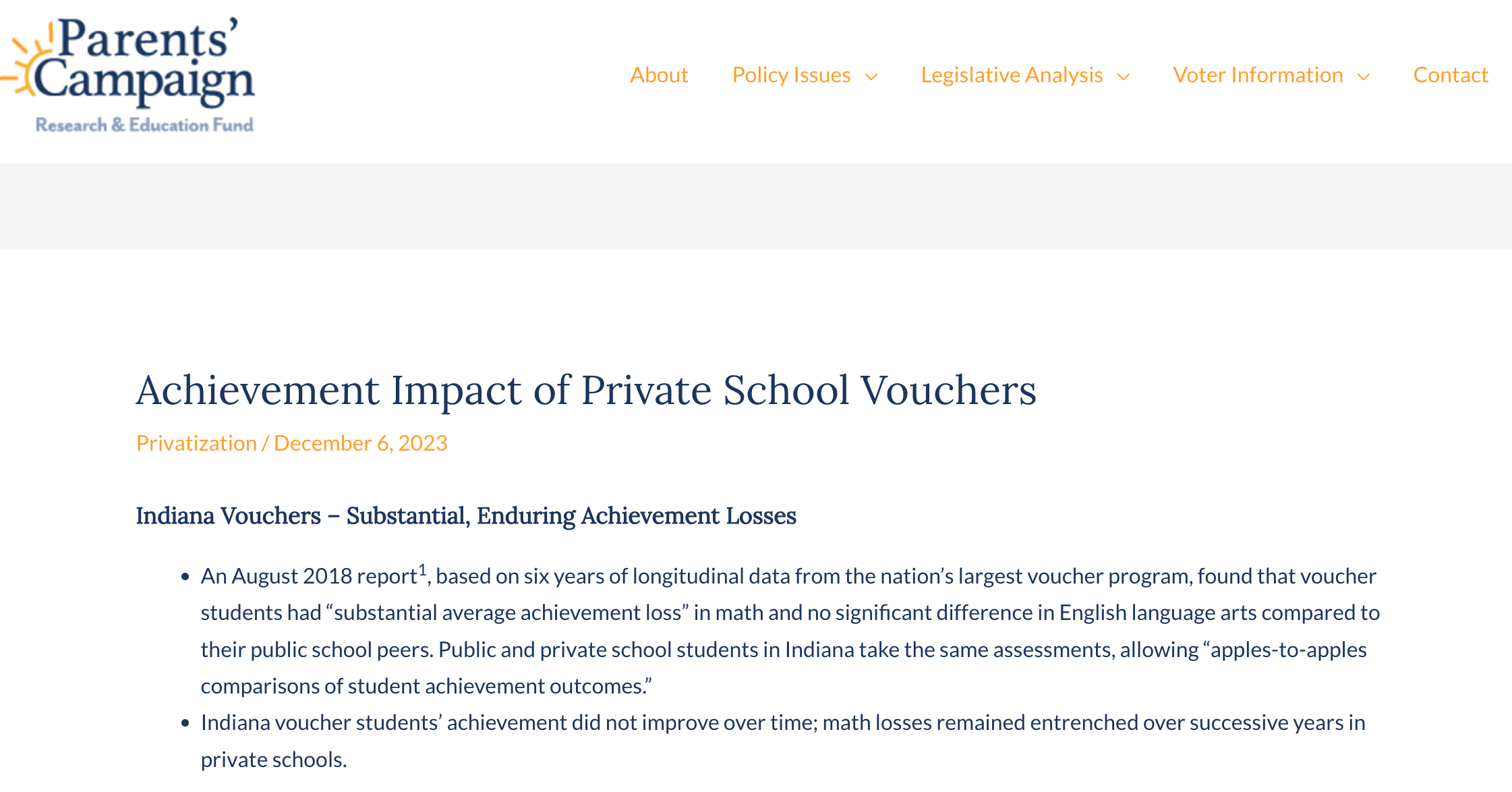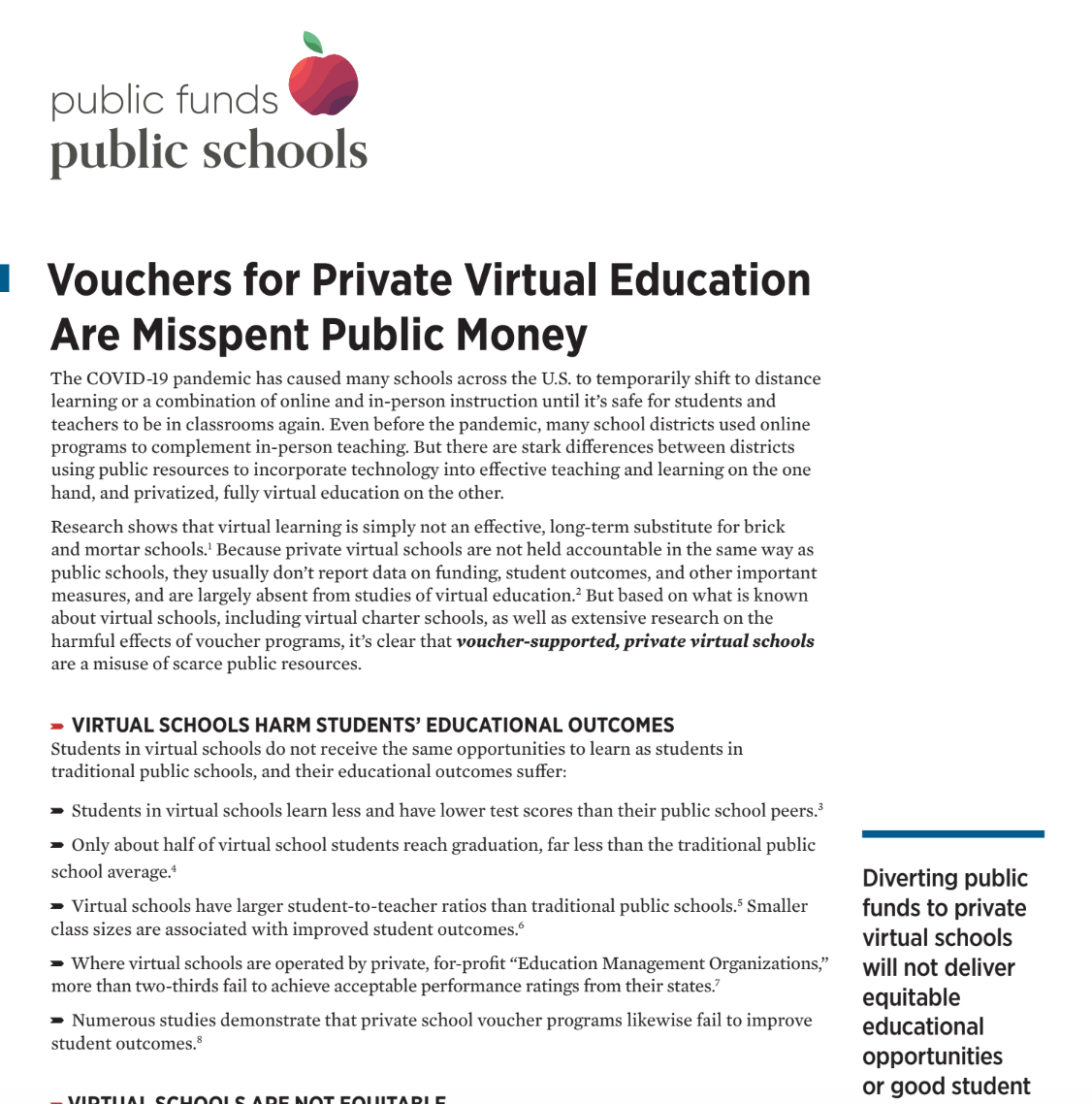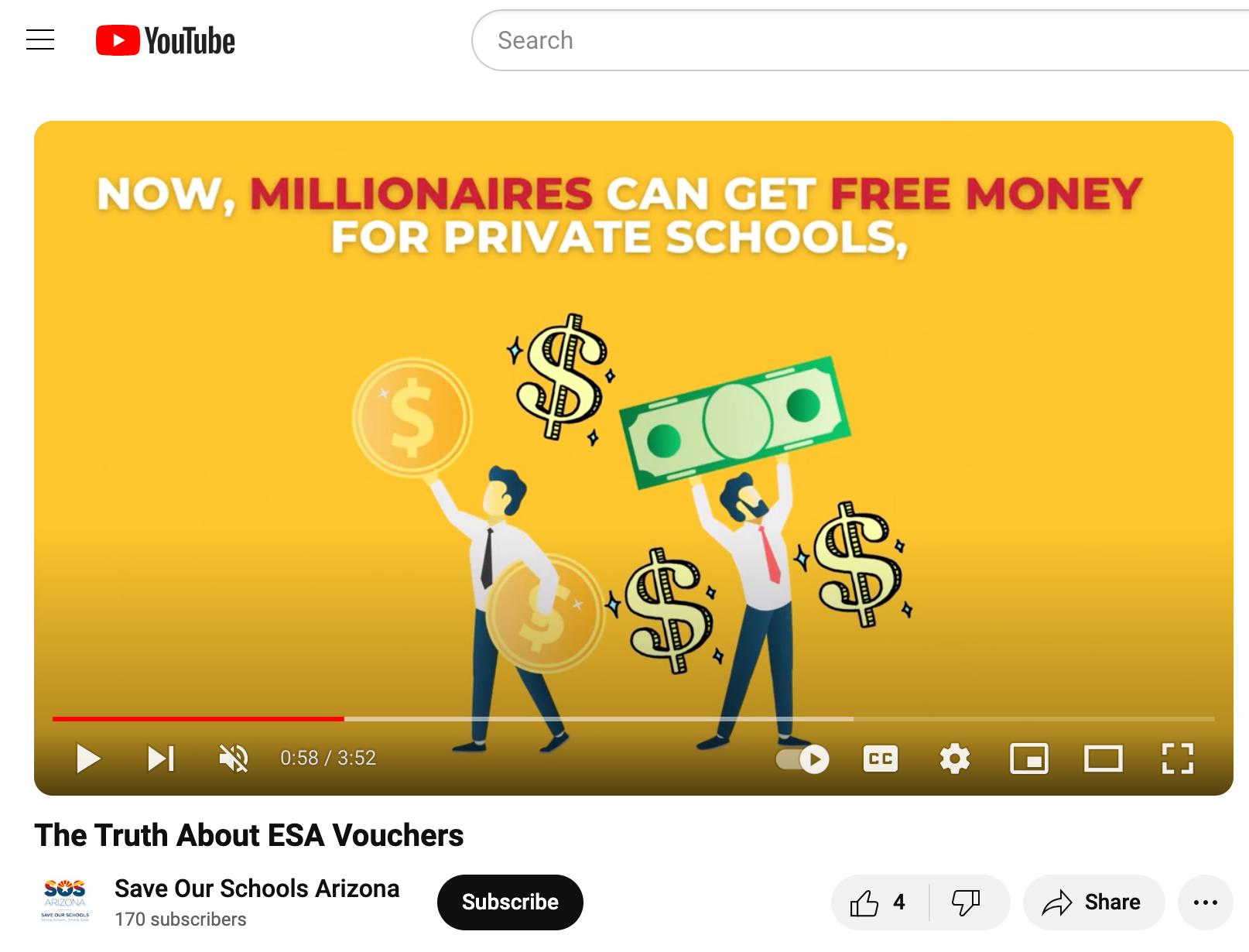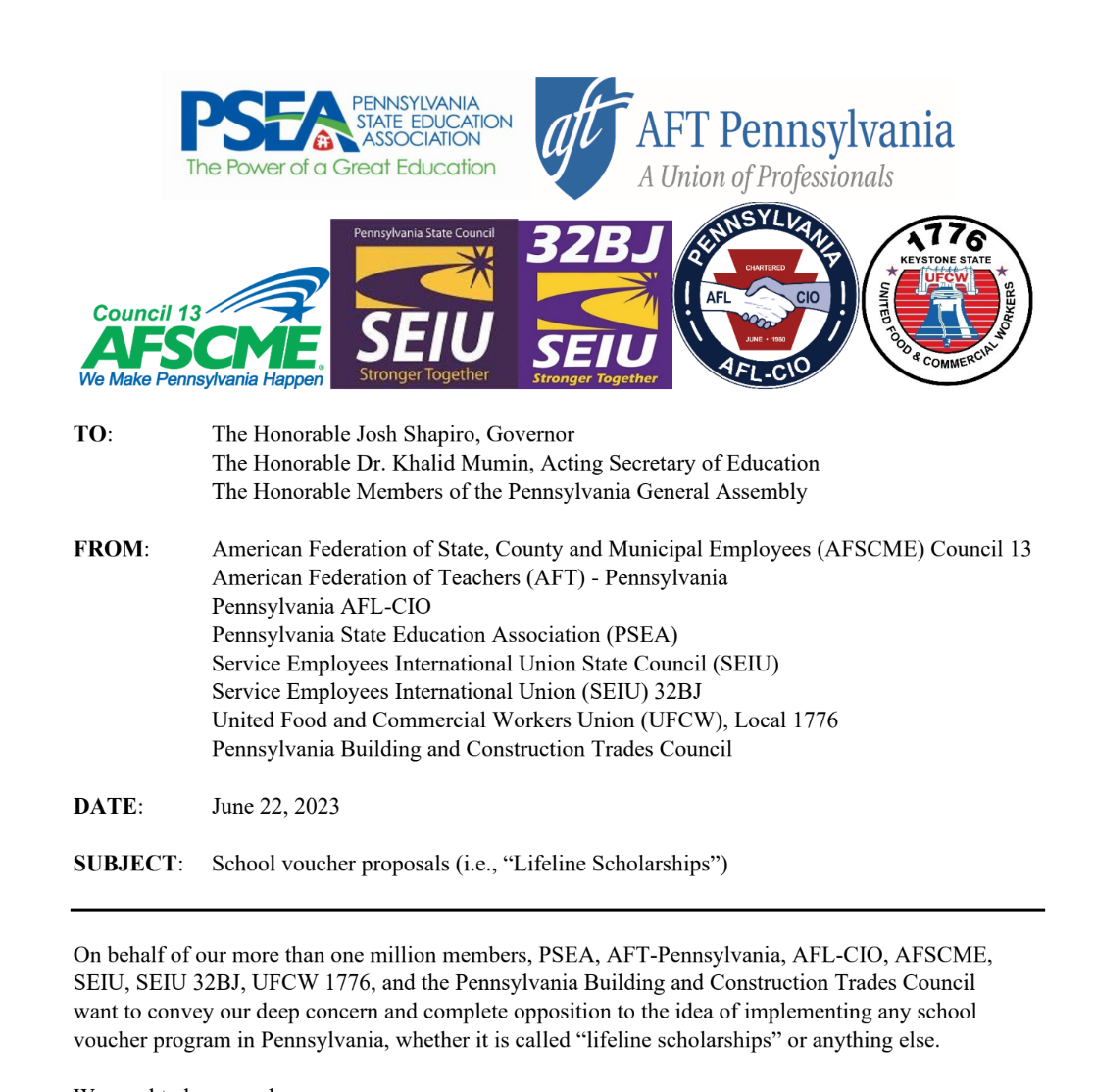ALL RESOURCES
FILTER BY TAG
Select a tag
- Academic performance
- Accessibility
- Accountability
- Advocacy
- Advocates
- Article
- Bill analysis
- Bill tracker
- Billionaires
- Blog post
- Civil rights
- Coalition building
- Community Schools
- Cost impact analysis
- Dark Money
- Data
- Disability
- Discrimination
- Drain funds from public education
- Education Savings Account (ESA)
- English language learners
- Fact sheet
- Fraud Waste and Abuse
- Graphic
- History
- Indigenous and Native Education
- Integration
- LGBTQ+
- Legislation
- Letter
- Litigation
- Messaging or talking points
- Model legislation
- National Voucher
- News
- Parents
- Personal narrative
- Podcast
- Policy brief
- Policymakers
- Radio
- Referendum
- Religion
- Report
- Rural communities
- Segregation
- Separation of church and state
- Slides
- State Constitutional Right to Education
- Students
FILTER BY AUTHOR
Select an author
- Aaron Sanderford
- Alec MacGillis
- Allen Pratt
- Associated Press
- Beth Lewis and Damaris Allen
- Bob Peterson
- Bruce Schreiner
- Carl Davis
- Casey Tolan, Rene Marsh and Nelli Black,
- Catherine Caruso
- CREED and HEAL NC
- Cyrus Driver and Mary Gonzalez
- Damaris Allen
- David Montgomery
- David Pepper
- Derek W. Black
- Donald Cohen
- EdTrust
- Education Law Center Pennsylvania
- Education Voters of Pennsylvania
- Eli Hager
- Emily Walkenhorst
- Ethan Dewitt
- Families for Strong Public Schools
- Florida Policy Institute
- Florida Policy Institute and the Education Law Center
- Geoff Mulvihill
- Georgia Budget and Policy Institute
- Gov. Roy Cooper and Gov. Andy Beshear
- Greg Adams, Kathy Campbell, Al Davis, Curt Friesen, Mike Gloor, John McCollister, Paul Schumacher, John Stinner, and Matt Williams
- Griffin Coop and Benjamin Hardy
- Hilary Wething
- Hilary Wething and Josh Bivens
- Howard Fischer
- Idaho Center for Fiscal Policy
- IDRA
- Illinois Families for Public Schools
- In the Public Interest
- Indiana Coalition for Public Education
- Jamie Klinenberg, Jon Valant, and Nicolas Zerbino
- Jasmine Bolton and April Callen
- Jason Bailey
- Jason Bailey, Dustin Pugel, Joanna LeFebvre, and Pam Thomas
- Jeff Bryant
- Jennifer Berry Hawes and Mollie Simon
- Jessica Corbett
- Jim Collier
- Joanna LeFebvre
- Joe Dana
- Jon Valant and Nicolas Zerbino
- Joshua Cowen
- Juan Perez Jr.
- Kevin Welner
- Kiera Butler
- Kris Nordstrom
- Kris Nordstrom, Phyllis Nunn
- Laura Pappano
- Laura Meckler and Michelle Boorstein
- Liam Amick
- Liz Canada
- Maurice Cunnningham
- Michelle Harven
- Missouri Budget Project
- National Coalition for Public Education
- National Education Association
- National Education Policy Center
- Network for Public Education
- New Jersey and National Organizations
- Nicole Stelle Garnett
- Nora De La Cour
- North Carolina Justice Center
- OpenSky Policy Institute
- Paige Masten
- Parents for Public Schools
- Pastors for Texas Children
- Patrick Darrington
- Paul Hammel
- Peter Greene
- Phil Williams
- Phoebe Petrovic
- Policy Matters Ohio
- Preston Green/Kevin Welner
- Public Funds Public Schools
- Public Funds Public Schools and Education Law Center
- Public Funds Public Schools and Idaho Center for Fiscal Policy
- Public Funds Public Schools and Joshua Cowen
- Public Funds Public Schools, Education Law Center, Southern Poverty Law Center
- Public School Forum of North Carolina
- Rebecca Clarren
- Reg Ballantyne
- Rob Boston
- Robert Huber
- Rowan Moore Geretsy
- Sam Stockard
- Sasha Pudelski
- Save Our Schools Arizona
- Sherri Jones
- Southern Education Foundation
- State Rep. Glenn Rogers
- Stephen Caruso, Angela Couloumbis, and Katie Meyer
- Steve Suitts
- Support Our Schools Nebraska
- The Parents' Campaign Research and Education Fund
- Up North Podcast
- Wisconsin Public Education Network
- Yesica Balderrama
- Zack Carreon, WVXU, Kendall Crawford

The Invest in Kids Program Must End Public Dollars, No Public Oversight
This Illinois Families for Public Schools fact sheet depicts how the Illinois Invest in Kids voucher program is characterized by discriminatory revenue, low academic quality, and compulsory child labor.

What we don’t know about Illinois’ Invest in Kids voucher program
Lack of transparency and oversight for how public dollars are being spent is a fundamental flaw of school voucher programs. The Illinois Invest in Kids program is halfway through its fifth school year, and there is still a lot we don’t know about schools and students receiving vouchers. Public access to that data from state agencies is limited.

Signs of fraud raise major red flags about expanding NC school vouchers
This op-ed by Kris Nordstrom calls out that many private schools in North Carolina have been awarded more vouchers than they have students. Yet shoddy financial oversight and potential fraud aren’t the only reasons why vouchers are a bad idea for North Carolina. The new data is just the latest evidence that voucher expansion is a mistake. The only question that remains is whether voucher proponents will bother trying to justify this reckless agenda.

Voucher Talking Points
This talking points document from the North Carolina Justice Center includes general talking points on the impact of school voucher programs and specific points in response to 2023 voucher legislation.

PEER Review of Vouchers: Fraud, Lack of Accountability; Unspent Funds
Mississippi’s PEER* Committee issues a report of the state’s ESA voucher program, which uses public funds to pay private school tuition for children with special needs.

Accountability and Private School Choice
The report Accountability and Private-School Choice, released by the Manhattan Institute in October, 2021, addresses the question of how private school voucher programs should be regulated. That is, if private schools are to receive public funds, what accountability mech- anisms can fairly and reasonably safeguard taxpayer dollars? The report advocates for re- laxing accountability mechanisms that presently constrain some voucher programs, assert- ing that “more and better” private schools will participate in response, benefitting students academically. Such claims, however, are supported by a selective reading and intentional misreading of educational research. Insofar as that is the case, the report merely repeats well-worn ideological positions and neither advances what we know about the challenge of regulating private schools nor offers useful information for policy decisions.

Florida Department of Education Data Request
This letter from the Florida Policy Institute and partners calls on the Florida Department of Education (FLDOE) and its scholarship funding organizations (SFOs), Step Up For Students and AAA Scholarship Foundation, to provide more information on students who have applied and been approved for Florida’s Tax Credit (FTC) Scholarships, Family Empowerment Scholarships – Educational Options (FES-EO), and Family Empowerment Scholarships for students with Unique Abilities (FES-UA).

Public Dollars for Private Schools: 6 Recommendations for North Carolina’s School Voucher Program
In this policy brief the Public School Forum of North Carolina provides six recommendations for North Carolina’s Opportunity Scholarship school voucher program. The Opportunity Scholarships program in its current or expanded form represents significant investment of taxpayer dollars to support private and parochial schools. Similar to public schools and public charter schools, private schools that receive public dollars must be held accountable to the taxpayers who fund them. Additionally, parents must have access to accurate and reliable information when making school choice decisions, and state leaders must have the data needed to effectively evaluate how private schools receiving public funds are performing and to ensure that all children are receiving a sound basic education.

School Choice: Myth vs. Truth
The Parents’ Campaign Research and Education Fund provides a myth vs. truth about the impact of school voucher programs.

Achievement Impact of Private School Vouchers
The Parents’ Campaign Research and Education Fund provides a state by state snapshot on voucher programs impact on student achievement.

What Do We Know About Voucher Schools
This National Education Association fact sheet sheds some light on Milwaukee’s school voucher programs. The research shows voucher schools are smaller than non-voucher private schools. They’re often financially distressed schools with high failure rates, and lower initial school quality indicators. A substantial portion of voucher schools are start-ups that did not exist before taxpayer support.

Vouchers for Private Virtual Education Are Misspent Public Money
Research shows that virtual learning is simply not an effective, long-term substitute for brick and mortar schools.1 Because private virtual schools are not held accountable in the same way as public schools, they usually don’t report data on funding, student outcomes, and other important measures, and are largely absent from studies of virtual education. But based on what is known about virtual schools, including virtual charter schools, as well as extensive research on the harmful effects of voucher programs, it’s clear that voucher-supported, private virtual schools are a misuse of scarce public resources.

How School Voucher Programs Hurt Students
In recent months, state legislatures across the country have broadened efforts to subsidize private school tuition with taxpayer dollars. New proposals for these programs—collectively called school vouchers—have appeared in more than a dozen states and passed as major priorities for Republican governors like Kim Reynolds in Iowa and Sarah Huckabee Sanders in Arkansas. Since 2021, Arizona, Florida, Utah and West Virginia have also created or expanded voucher plans. Meanwhile, a handful states like Indiana, Louisiana, Ohio and Wisconsin have run voucher programs for years. But do school vouchers actually work? We need to focus on what research shows, and what that means for kids moving forward.

The State of Education Savings Account Programs in the United States
Education Savings Accounts are a new form of private school choice and are arguably the most strongly promoted approach by voucher advocates. This policy brief examines the emerging policy, considering how it mirrors and differs from conventional voucher ap- proaches and examining the legal issues that it raises.

Mississippi Voucher ESA Program
The Equal Opportunity for Students with Special Needs Act became law in 2015, establishing Education Scholarship Accounts (ESA) vouchers. The ESA voucher program allows Mississippi parents to use state funds to pay private school tuition for children with special needs. Initially, eligibility was limited to students who had an active IEP within the past 18 months; it was later expanded to students who had an active IEP within the past five years. The Legislature’s Performance Evaluation and Expenditure Review (PEER) Committee issued a highly critical report on the program in December of 2018.

Letter to IRS on Section 1001 Regulation in 2023-2024 Priority Guidance Plan
The National Education Association and partners wrote a letter urging that the IRS return to the work it left unfinished in 2019 when it issued final regulations on “Contributions in Exchange for State or Local Tax Credits” (RIN: 1545-BO89). Specifically, they suggest that the IRS issue a regulation clarifying the following:
A contribution of property in exchange for a 100 percent tax credit should be treated as equivalent to a sale at market value (“other disposition of property” under IRC section 1001) and the taxpayer should either owe tax on the portion of that sale that represents a gain, or recognize a loss if appropriate. When the contribution is made in exchange for a tax credit worth less than 100 percent of the amount donated, the transaction should be treated as part gift and part sale.

The Truth About ESA Vouchers
In this video Save Our Schools Arizona outlines the truth about the Empowerment Scholarship Account voucher program.

Joint Letter re “Lifeline Scholarship” Proposal
The Education Law Center-PA, PSEA, AFT-Pennsylvania, AFL-CIO, AFSCME, SEIU, SEIU 32BJ, UFCW 1776, and the Pennsylvania Building and Construction Trades Council on behalf of their members wrote a letter to the Shapiro administration conveying deep concern and complete opposition to the idea of implementing any school voucher program in Pennsylvania, whether it is called “lifeline scholarships” or anything else

Report to the Shapiro/Davis Team on Education in the Commonwealth
Education Voters of Pennsylvania developed this section on Pennsylvania’s EITC/OSTC school voucher programs with support from the PA Schools Work Campaign. The Educational Improvement Tax Credit (EITC) and Opportunity Scholarship Tax Credit (OSTC) voucher programs work by reducing taxes paid by businesses to the state when they contribute to scholarship organizations that provide vouchers for children to attend a private or religious school. The programs are administered by the Pennsylvania Department of Community and Economic Development (DCED).

PA’s EITC and OSTC Training Module
Education Voters of Pennsylvania developed a series of modules on school funding topics for advocates. The Educational Improvement Tax Credit (EITC) and the Opportunity Scholarship Tax Credit (OSTC) module includes a video, handouts, activities and a mini quiz to check for understanding and certify your completion of the course. Most should take less than ½ hour to complete and you can work at your own pace.
